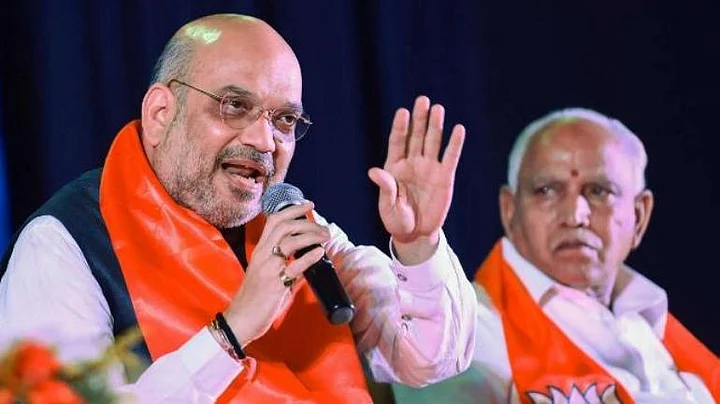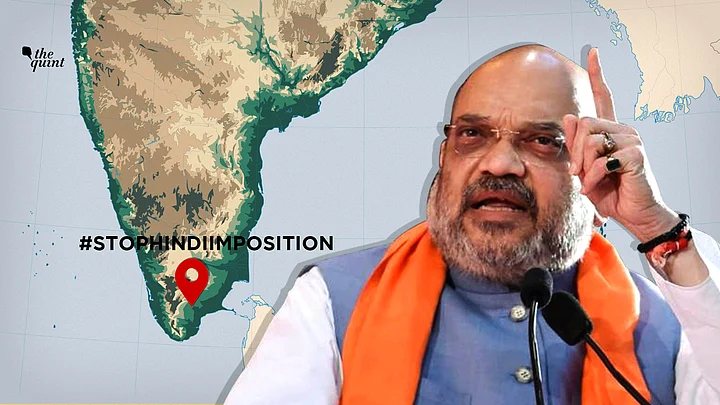Being the only south Indian state ruled by the saffron party, the debate over Hindi language has created a catch-22 situation for the BJP in Karnataka. With language strongly ingrained in the state’s politics, the BJP often finds its leaders divided on the party’s ‘one nation, one language’ push.
After Union Home Minister Amit Shah’s statement on Hindi being the only language that can unify the country, the Congress party, especially former Chief Minister Siddaramaiah has been attacking the BJP for its ‘anti-Kannada’ policies. In a series of tweets, Siddaramaiah called Amit Shah a ‘home wrecker’.
“India has rich history and diverse geography. Each explains its own vibrant culture and practice. We have to embrace the diversity to remain United. @AmitShah is like a wicked insider in a joint family who find ways to break the unity. This home wrecker needs to be taught a lesson!!” Congress leader Siddaramaiah said in a tweet.
But the BJP’s problems are not limited to the Congress. Shah’s statement has created difference of opinion within the party itself. A section of the governing party’s state leaders including Prahlad Joshi, D V Sadananda Gowda have endorsed the idea of Hindi as a unifying language, while another section of leaders like CT Ravi and Suresh Kumar spoke against the imposition of the language.
But the matter was put to rest when BS Yediyurappa announced that Kannada is the principal language of the state.
While the chief minister’s statement ensured the party’s Kannadiga supporters didn’t agitate and the issue went by without much protest, one problem with Yediyurappa’s statement was pointed out:
Kannada being the principal language of the state has never been contested, but, it is how much of Hindi should be introduced in the state that has been the bone of contention. In the fields of banking and education, for years, the state had faced problems with the imposition of Hindi. And now, the BJP leaders find themselves in a fix.
Hindi in Rural Banks
In the state capital and in Karnataka’s major cities, Hindi is spoken by many. Especially in Bengaluru, with a large population of Urdu speakers and an inflow of migrants, Hindi has gained acceptability as one of the bridge languages, but in the villages across the state, Kannada remains the sole language of communication.
In August 2018, The Karnataka Development Authority (KDA) had asked senior bank managers working in the state to learn Kannada within six months or face getting sacked, raking up a controversy. KDA cited several instances of bank employees posted in rural parts of the state, where Kannada is the only spoken language, using Hindi for official communication as the reason behind the order.
Since 2016, several protests held by pro-Kannada organisations have been demanding the compulsory use of Kannada in banks.
It was the Central government’s order that led to the war over language. Until 2014, the recruitment exams for Regional Rural Banks (RRBs) were held at the state level and in the local language. A domicile clause also ensured only local language speakers got posted in the rural banks across the state. However, when the NDA government changed in the rule in 2014, the examination was centralised, and is held only in English and in Hindi. Further, the domicile clause was removed in the posting of bank officials and thus, non-Kannada speakers are posted in rural areas.
In the case of nationalised banks, there were neither any examinations in the regional languages nor localised postings.
After a long political battle, on 4 July this year, Finance Minister Nirmala Sitharaman announced recruitment exams for RRBs will be held in 13 regional languages, including Kannada. However, the ministry had remained silent on the domicile clause.
Even though person from Karnataka can take the examination in Kannada, but he could be posted anywhere in the country.
“The problem is simple. When a Kannadiga or a Tamil goes to a north Indian state, he learns Hindi because his customers speaks the language, but when someone is posted in Karnataka, learning the language doesn’t happen.” pointed out an SBI bank official, who has followed the issue closely.
“More than just a language issue, it is a customer issue. A simple example is that fact challans in many banks have only Hindi and English as language options,” he added.
While some BJP leaders were instrumental in getting bank examinations to be conducted in regional languages, on the domicile rule the party has not challenged the central leadership.
Three-Language Policy in Education
In early 2019, when there was a push to make Hindi mandatory in schools across the country, Karnataka was among the states which strongly opposed the decision.
A draft report prepared by the K Kasturirangan Committee on the New Education Policy (NEP) in January 2019 had proposed a three-language formula with Hindi being made mandatory till class 8 across the country.
Apart from Hindi imposition, Karnataka was opposed to the decision because the state government had learnt that several CBSE and ISCE schools in the state were not teaching Kannada as one of the languages. It was feared that mandating Hindi would further reduce the number schools providing Kannada as a language option.
The state government had written to the CBSE and the ISCE, directing them to ensure that affiliated schools introduce Kannada as the first or the second language in accordance with The Kannada Learning Act, 2015.
Even in this, the BJP leaders were divided. “In the name of a three-language formula, one language should not be imposed on others,” said BS Yeddyurappa, while Tejasvi Surya opposed the move claiming the three-language policy was necessary.
With the BJP in power, the government has the responsibly of implementing the Act which mandates Kannada, even as the Central leadership is pushing for Hindi.
BJP leaders have made it clear time and again that Kannada is primary in the state, but real trouble for the leaders will come when they have to oppose the Central leadership’s plans to implement Hindi as a unifying language.
(At The Quint, we question everything. Play an active role in shaping our journalism by becoming a member today.)



